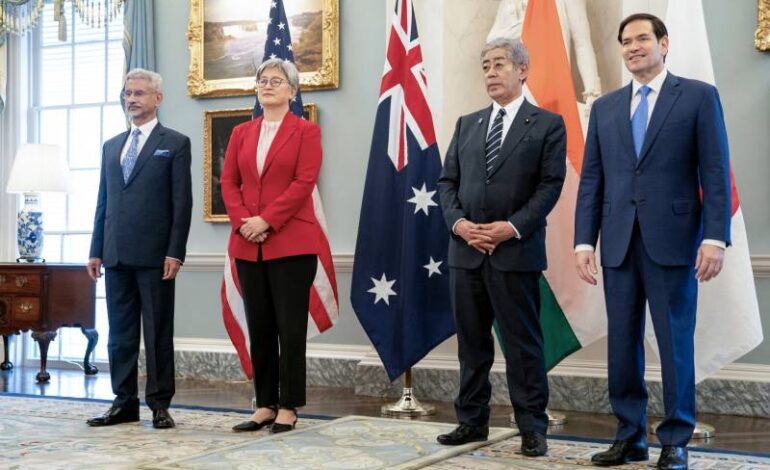
Quad Condemns Pahalgam Attack, Launches Minerals Initiative to Counter China
WASHINGTON – In a strategic gathering of the Quad alliance — comprising the United States, Japan, India, and Australia — the four nations pledged joint efforts to ensure a stable and diversified supply of critical minerals, a move seen as a direct response to China’s dominance in global mineral markets.
Hosted in Washington by U.S. Secretary of State Marco Rubio, the meeting shifted attention back to the Indo-Pacific region after months of U.S. focus on Ukraine, the Middle East, and domestic concerns. On India’s insistence, the Quad foreign ministers unanimously condemned the Pahalgam attack in Indian-Occupied Jammu and Kashmir, which claimed the lives of several Hindu civilians.
In a joint statement, the four countries announced the launch of the Quad Critical Minerals Initiative, aimed at “collaborating on securing and diversifying supply chains” for resources essential to modern technology, such as those used in electric vehicles, semiconductors, and clean energy systems.
Without directly naming China, the statement raised concerns over economic coercion, price manipulation, and supply chain disruptions, warning that over-dependence on a single nation for critical mineral processing poses serious strategic risks.
The ministers also voiced “serious concerns” over provocative actions in the South China Sea and East China Sea, which they said threaten peace and regional stability.
China currently controls a significant share of the global supply of graphite and other rare earth elements crucial for battery and defense industries. The Quad members aim to break that dependency.
During the summit, Indian Foreign Minister Subrahmanyam Jaishankar pressed for a stronger stance on regional security and urged the group to condemn the May terrorist attack in Pahalgam. The Quad called for swift justice, stating that “the perpetrators, organizers, and financiers of this reprehensible act must be brought to justice without delay.”
In response to the Pahalgam attack, India launched airstrikes on Pakistan, which it blamed for the incident. Pakistan denied involvement and retaliated by targeting Indian military assets.
Beyond China and Kashmir, the joint statement also condemned North Korea’s destabilizing missile tests, reaffirming commitment to its complete denuclearization — a key security priority for Japan.
Despite unity on China-related issues, the Quad refrained from addressing divisive matters like Russia’s invasion of Ukraine and Iran, highlighting geopolitical differences within the alliance. India maintains longstanding ties with Russia, while both India and Japan have historically engaged diplomatically with Iran.
The Quad’s strategic vision, first conceived by the late Japanese Prime Minister Shinzo Abe, centers on promoting a free and open Indo-Pacific. The group plans to convene again later this year, with U.S. President Donald Trump expected to visit India for a Quad Summit.






